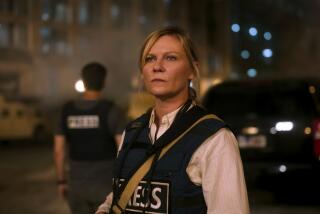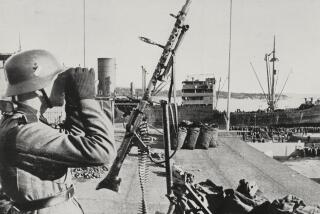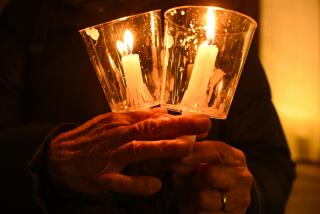Op-Ed: The rhymes of history echo from World War I
At the 11th hour of the 11th day of the 11th month in 1918, the Great War was over. But the “War to End All Wars” famously didn’t live up to its billing. Still, it had greater impact on the world than any event of the last thousand years. The question is whether another such war might be looming today.
It was in World War I that humanity first practiced the industrialization of human slaughter — 16 million people were killed, more than 17 million were wounded.
Nobody could seem to stop it. During the height of the carnage, at the battle of the Somme, about 60,000 died the first day. Four great empires expired in the war, more than in any other event in history. The German, Austrian, Russian and Ottoman empires were destroyed and dismembered. Out of their carcasses were born 11 new countries.
Five of those countries — Iraq, Jordan, Palestine (now Israel), Syria and Lebanon — are in the Middle East. They are still the source of some of the most intractable conflicts on the planet.
Communism came into being as a state-based system as a result of World War I. The war played a major role in bringing down the government of the Russian czar in 1917. Into the breach leapt the Bolsheviks, led by Vladimir Lenin. Their seizure of power set the stage for one of the most enduring conflicts of the 20th century, the Cold War.
And World War I was the moment in history when the center of global power shifted, from Europe to the United States, where it has resided ever since.
In other words, industrialized war, communism, the U.S. as the dominant world power and the modern Middle East had their origins in World War I. No event of the last 1,000 years has so decisively rearranged the architecture of global power.
But could such a tectonic upheaval happen again? Three patterns of conflict in the world today remind us of patterns that presaged World War I.
The first is the fact of a declining imperial power being confronted by a rapidly growing upstart. In World War I, Britain was the declining power while Germany was the galloping upstart. In 1850, Britain controlled almost 60% of the entire world’s wealth, compared with 3% for Germany. By 1913, Britain’s share had shrunk to 14%, and Germany’s had risen to 21%.
Today, the dominant global power is the United States. It is being challenged, at least economically, by China. In October, China became the largest economy in the world in purchasing power parity terms. It could shortly surpass the U.S. in raw terms. Economic power inevitably translates into political power — an echo of early 1900s.
The second parallel is the forming of global states into blocs, or alliances. In the lead-up to World War I, the Triple Alliance faced off against the Triple Entente — Germany, Austria-Hungary and Italy against England, France and Russia.
Today, world powers are again forming alliances. They are the U.S. and Europe, as the dominant powers, against Russia and China, the challengers. The current conflict in Ukraine has driven Russia and China closer together. They may be joined in their alliance by Brazil, India and South Africa. Think of it as the “haves” versus the “want-to-haves.”
The final parallel is conflict in the Middle East. World War I was fundamentally about who would control the collapsing Ottoman Empire, with its oil riches in the Persian Gulf. Germany had made friends with the Ottomans. If they seized the gulf it would have posed an existential threat to Britain, which ran its globally deployed navy on gulf oil. The war had to happen.
The conflict in the Middle East today is about oil as well. Oil is the lifeblood of industrial civilization, but it is running out. The U.S. invasion of Iraq in 2003 is now notorious for having been carried out under false pretenses, the real story being oil. Still, today, we fight for who will control the Persian Gulf, and, therefore, the world.
It’s been said that “history never repeats itself, but it does rhyme.” There won’t be a second World War I, but we can hear the rhymes of history echoing from that tectonic upheaval of 96 years ago.
Robert Freeman is the author of “The Best One-Hour History” series, which includes “World War I,” “The Protestant Reformation” and “The Cold War.”
Follow the Opinion section on Twitter @latimesopinion
More to Read
A cure for the common opinion
Get thought-provoking perspectives with our weekly newsletter.
You may occasionally receive promotional content from the Los Angeles Times.






